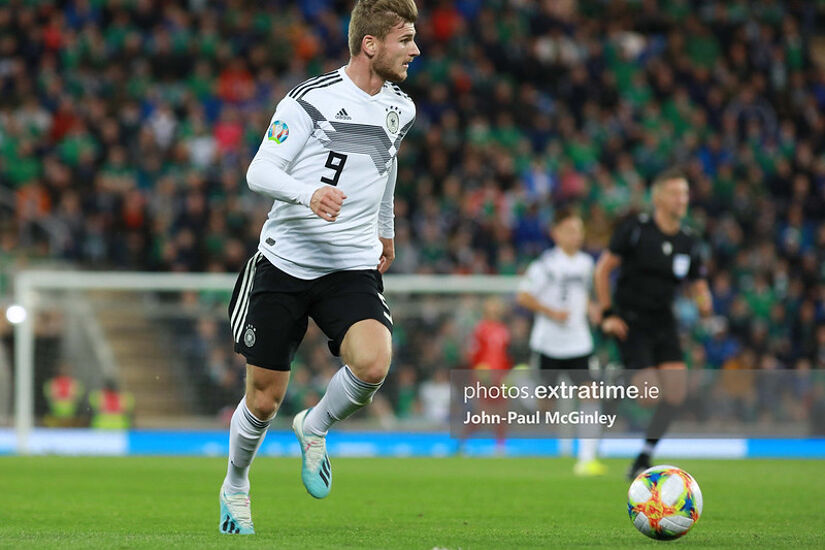Euro 2020 Profile: Germany

Credit: John-Paul McGinley (ETPhotos)
Team: Germany
Manager: Joachim Low
Group: F
Other Teams in Group: France, Portugal, Hungary
SQUAD
This is manager Joachim Low’s final tournament at the helm of Die Mannschaft and he has opted for a very experienced squad ahead of their challenge to negotiate the aptly named group of death with heavyweights Portugal winners of EURO 2016 and World Champions France. The most eye raising inclusions are that of veterans Mats Hummels and Thomas Muller who have been recalled after serving a two year exile.
Low has selected the ever present dependable Manuel Neuer as his number one goalkeeper and has good options in reserve with Arsenal’s Bernd Leno and Eintracht Frankfurt’s Kevin Trapp rewarded for his outstanding displays in the Bundesliga this season.
As well as the vastly experienced Hummels there is Chelsea’s Antonio Rudiger who was a key player in The Blues success in the Champions League this season. Low has included the RB Leipzig pairing of Marcel Halstenberg and Lukas Klostermann as well as exciting young defenders in Atalanta’s Robin Gosens and Bayern’s Niklas Sule as well as rewarding Robert Koch for a fine season with Leeds in the Premier League.
In midfield, there is a wealth of experience and exciting attacking talent with Real Madrid’s Toni Kroos expected to pull the strings along with Bayern’s Joshua Kimmich. Ilkay Gundogan had a superb season with Manchester City and Chelsea’s Kai Havertz offer an extra dimension in attack. The Bayern duo of Leon Goretzka and Serge Gnabry gives Low some additional selection headaches to contend with.
Thomas Muller will be expected to lead the line up front along with the experience team-mate Leroy Sane and Chelsea’s Timo Werner. There have also been call ups for Monaco’s Kevin Volland after an impressive season in Ligue 1 as well as teenager Jamal Musiala from Bayern and Florian Neuhaus from Borussia Moenchengladbach.
The squad in full:
Goalkeepers: Bernd Leno (Arsenal), Manuel Neuer (Bayern Munich), Kevin Trapp (Eintracht Frankfurt)
Defenders: Matthias Ginter (Borussia Monchengladbach), Robin Gosens (Atalanta), Christian Gunter (Freiberg), Marcel Halstenberg (RB Leipzig), Mats Hummels (Borussia Dortmund), Lukas Klostermann (RB Leipzig), Robin Koch (Leeds United), Antonio Rudiger (Chelsea), Niklas Sule (Bayern Munich)
Midfielders: Serge Gnabry (Bayern), Leon Goretzka (Bayern), ??lkay Gündo?an (Manchester City), Jonas Hofmann (Mönchengladbach), Joshua Kimmich (Bayern), ?Toni Kroos (Real Madrid), ??Jamal Musiala (Bayern), ???Florian Neuhaus (Mönchengladbach), Leroy Sane (Bayern).
Forwards: Thomas Muller (Bayern Munich), Jamal Musiala (Bayern Munich), Florian Neuhaus (Borussia Monchengladbach), Leroy Sane (Bayern Munich), Kevin Volland (Monaco), Timo Werner (Chelsea)
HOW THEY GOT THERE
Germany began their qualification campaign in Group C by seeing off their bitter rivals The Netherlands in a 3-2 thriller at the Johan Cruyff Arena in Amsterdam back in March 2019. Leroy Sane and Serge Gnabry had Germany cruising 2-0 at the break only for Mattias De Ligt and Memphis Depay to turn the game on its head after the break to draw the Dutch level. Defender Nico Schulz broke Dutch hearts when he popped up with the winner in the 90th minute.
In June, Die Mannschaft had it much more comfortable in their next two encounters with a 2-0 away win over Belarus in Minsk and followed that up with an 8-0 thrashing of the hapless Estonia in Mainz with Marco Reus and Serge Gnabry grabbing a brace each to make it three wins from three for Joachim Low’s side.
In September 2019, the Germans suffered their only defeat in qualifying when the Dutch gained revenge for their last gasp defeat in Amsterdam by going to Hamburg and winning 4-2 despite going behind after only nine minutes. They got back to winning ways a few days later with a 2-0 win over Northern Ireland in Belfast with Gnabry among the goals again.
Germany had easy wins over wins over Estonia (3-0) in Tallinn and 4-0 over Belarus in Monchengladbach in their next two qualifiers and rounded off the campaign and clinched top spot in the group with a comprehensive 6-1 demolition of Northern Ireland in Frankfurt in November 2019.
KEY PLAYERS TO WATCH
Germany will be heavily reliant on the experienced players of Manuel Neuer, Mats Hummels, Toni Kroos and Thomas Muller if they are to win their first European Championships since 1996 but they do possess some very exciting young attacking talent in the guise of Bayern’s Serge Gnabry who had a superb season in the Bundesliga.
Chelsea’s Kai Havertz has the potential to explode into life and his team-mate at Stamford Bridge Timo Werner may become the talisman up front that he hinted at becoming in his maiden season in the English top flight.
The jewel in the German crown may well come in the form of teenage sensation Jamal Musiala from Bayern who if given the opportunity may well light up the tournament for Die Mannschaft.
WHERE THEY ARE PLAYING AND STAYING
Fubball Arena, Munich: June 15 v France KO 20.00
Fubball Arena, Munich: June 19 v Portugal KO 17.00
Fubball Arena, Munich: June 23 v Hungary KO 20.00
THREE INTERESTING FACTS ABOUT THE TEAM
Germany have twice previously lifted trophy twice in their history in 1972 beating the Soviet Union 3-0 in the final and in 1996 after a golden goal 2-1 win over the Czech Republic.
Oliver Bierhoff made history in 1996 at Wembley Stadium when he scored the only golden goal winning goal in the final of a major tournament to clinch victory for Germany.
In Germany, the teams do not celebrate victories with champagne but rather the players (and sometimes fans) shower each other with beer usually poured from a giant mug.
RECENT FORM
Romania 0-1 Germany
Germany 1-2 North Macedonia
Germany 1-1 Denmark
First game: June 15 v France, KO 20.00

